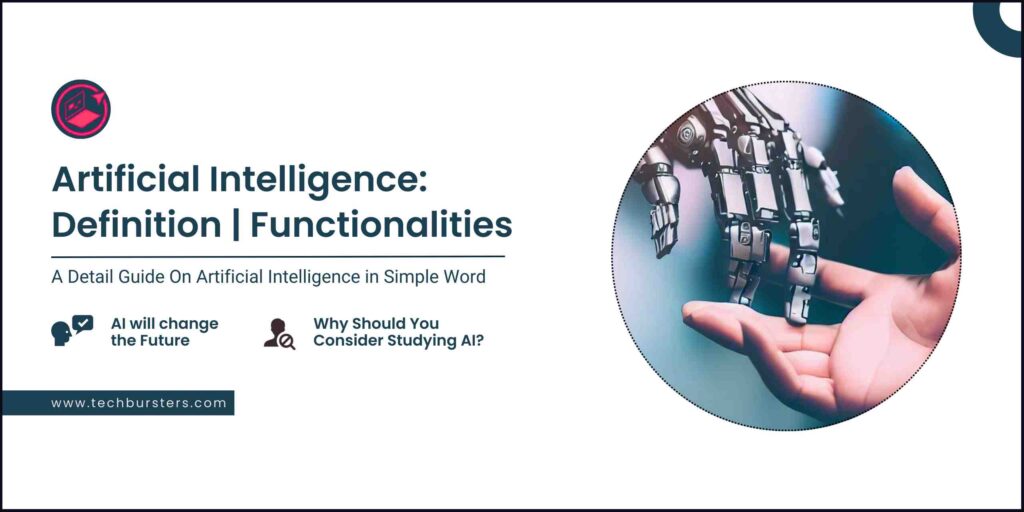
What Is Artificial Intelligence? | Definition
Artificial intelligence leverages computers and machines to mimic the problem-working and conclusion-forming capabilities of the natural mind. It’s the wisdom and engineering of making intelligent machines, especially intelligent computer programs. It’s related to the analogous task of using computers to understand mortal intelligence, but AI doesn’t have to confine itself to styles that are biologically observable. It’s Kind of Intelligence is the computational part of the ability to achieve goals in the world. Varying kinds and degrees of intelligence eventualities in people, numerous creatures, and some machines.
Artificial intelligence is attributed to software technologies that manufacture a robot or computer to act and think like a human. Some software masterminds say that it is only artificial intelligence if it performs as well as a mortal. In this environment, when we talk about performance, we mean mortal computational delicacy, speed, and capacity. AI Contrasts with our natural Intelligence. It becoming more common in business and production processes as well as in our daily uses.
Artificial intelligence was innovated as an academic discipline in 1956, and in the times since has endured several swells of sanguinity, followed by disappointment and the loss of backing (known as an “AI downtime”), AI exploration has tried and discarded numerous different approaches since its founding, including bluffing the brain, modelling mortal problem working, formal sense, large databases of knowledge and imitating beast gets. In the first decades of the 21st century, largely fine-statistical machine literacy has dominated the field, and this fashion has proved largely successful, helping to break numerous gruelling problems throughout assiduity and academia.
How Does Artificial Intelligence Work?
Artificial Intelligence (AI) involves using computers to do effects that traditionally bear mortal intelligence. This means creating algorithms to classify, dissect, and draw prognostications from data. It also involves acting on data, learning from new data, and perfecting over time. AI systems work by combining large sets of data with intelligent, iterative processing algorithms to learn from patterns and features in the data that they dissect. Each time an AI system runs a round of data processing, it tests and measures its own performance and develops fresh moxie.
Because AI never needs a break, it can run through hundreds, thousands, or indeed millions of tasks extremely snappily, learning a great deal in veritably little time, and getting extremely able at whatever it’s being trained to negotiate. But the trick to understanding how AI truly works is understanding the idea that AI is not just a single computer program or operation, but an entire discipline, or a science.
The thing of AI wisdom is to make a computer system that’s able of modelling human behaviour, so that it can use mortal-suchlike thinking processes to break complex problems. To negotiate this ideal, AI systems use a whole series of ways and processes, as well as a vast array of different technologies. By looking at these ways and technologies, we can begin to really understand what AI actually does, and therefore, how it works, so let’s take a look at those coming.
What Technology Does AI Require?
AI isn’t new, but its extensive request and utility have skyrocketed in current years cheers to substantial improvements in technology. In fact, the explosive growth of AI’s gage and worth is closely connected to recent scientific advances, including:
- Higher & More Accessible Data Sets – AI thrives on data, and has grown in importance alongside the rapid increase of data, along with improved access to data. Deprived of developments like “The Internet of Things”, which produces a huge amount of data from connected devices, AI would have far fewer potential submissions.
- Graphical Processing Units – GPUs are one of the key enablers of AI’s increasing value, as they are critical to providing AI systems with the power to perform millions of calculations needed for interactive processing. GPUs provide the computing power wanted for AI to quickly procedure and interpret big data.
- Intelligent Data Processing – New and more advanced procedures allow AI schemes to analyse data faster and at multiple levels simultaneously, serving those organizations to examine data sets far earlier so they can better and more quickly comprehend multifaceted systems and forecast rare proceedings.
- Application Programming Interfaces – APIs allow AI functions to be added to traditional computer programs and software applications, essentially making those classifications and agendas cleverer by enhancing their aptitude to classify and understand designs in data.
Good to Read- What Is Socketxp? Review | Prices
Why Should You Consider Studying AI?
AI technologies are existence advanced and practical to virtually every industry, helping improve consequences, automate procedures, and enhance organizational performance.
The AI industry itself is growing fast, with the International Data Corporation (IDC) broadcasting that the AI market, “including software, hardware, and amenities, is prediction to grow 16.4% year over year in 2021 to $327.5 billion.”
Top professions in the field also tend to come with great pays, with U.S. Survey Agency data broadcasting that the average salary for AI specialists is $102,521. If you’re absorbed in pushing the boundaries of computer technology and you want to launch a career in a field that’s increasing, and pays well, then AI may be the perfect vision.
How Artificial Intelligence will Change the Future?
According to a report on the Future of Professions by the World Economic Forum, AI will create 58 million new artificial intelligence jobs by 2022. There is an outstanding possibility that by 2030 AI will outstrip people in most of the rational tasks, but that does not mean it will take away work. Artificial intelligence has had a huge impact on many industries in recent ages and will continue to take advantage of them in the coming days. The pandemic-induced quickening of technology acceptance has led many sectors, both private and public, to influence AI for their benefit and development.
In the last few years, AI has allowed many inventions and determined the proliferation of technologies like IoT, robotics, analytics, and voice assistants. According to a report, AI topped the patent splinters in 2020. This is not new. AI has been securing many copyrights in the last few years.
AI and its Impact:
Artificial intelligence has had huge effects on the healthcare sector, particularly during the pandemic last year. AI and other trouble-making technologies motorized a patient-centered healthcare organization. This new upkeep scenario is all digital and tourist attractions the standing of data and analytics. Extrapolating analytics, machine learning, and AI played an essential part in drug discovery and vaccine progress. In the coming years, the use of these innovative technologies will become the standard, and easily reachable electronic medical records will simplify diagnostics. AI will enable healthcare systems to track and monitor patients in real-time, gain genetic data, and each person’s existence. Procedures will take up the charge of identifying health conditions and endorsing suitable actions.
The grouping of AI and humanoid intelligence will lead to the growth of sophisticated cybersecurity modernizations in the future. AI will enable an efficient battle against increasing cyberattacks and crime.
AI has a lot to suggest to the transport and industrial manufacturing sectors. In the coming years, we might observe the perfect evolution and commercialization of smart and autonomous vehicles. Self-driving cars are already available today, but in the next two to three decades, the world will eyewitness more people using them. The Industrial manufacturing sectors will also improve benefits from AI. Augmented use of robots in factories and extrapolative analytics in the sector will improve the superiority of products and rationalize the logistics and supply chain.
Other potential impacts of AI would be in elder care systems, education, finance and business, customer services, media, space exploration, shrewd cities, and homes.
Conclusion
To better formulate for the future of humanity in which artificial intelligence (AI) will have abundant prevalent inspiration in our lives, a better understanding of the difference between AI and human intelligence is needed. Human and biological intelligence cannot remain separated from the process of self-replication. There is much debate as to whether such an appropriately involuntary computer would be a mind, or would simply pretend one, but AI investigators did not wait for the conclusion to that deliberation, nor for the imaginary computer that could model all of the human intelligence.
Aspects of intelligent behaviours, such as resolving problems, making implications, learning, and understanding language, have already been coded as computer programs, and within very limited domains, such as recognizing diseases of soybean plants, AI programs can outdo human professionals.
